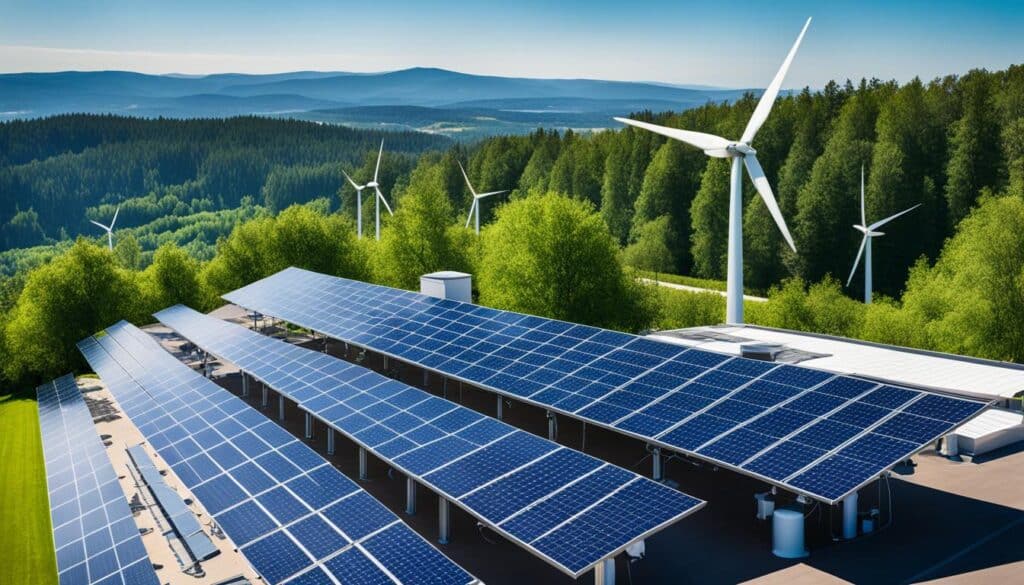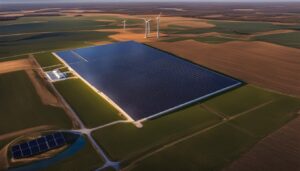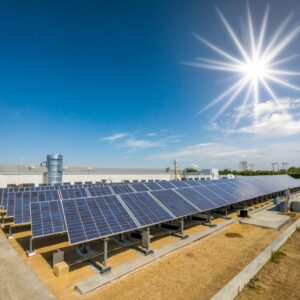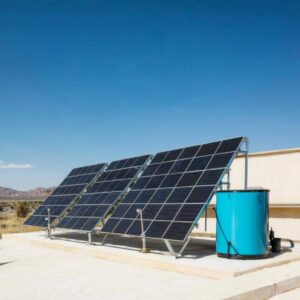
Solar energy management systems are transforming the way power is harnessed and utilized for efficient and sustainable control. These advanced systems incorporate cutting-edge technologies to optimize the generation, storage, and distribution of solar energy. By revolutionizing power management, these systems offer numerous benefits, including increased efficiency, reduced energy costs, and minimized environmental impact. To understand the significance and potential of these systems, it is essential to delve into the details of their features, components, and advantages.
Key Takeaways
- Solar energy management systems revolutionize power management through efficient utilization of solar energy.
- These advanced systems offer increased efficiency, reduced energy costs, and minimized environmental impact.
- Understanding the features and components of solar energy management systems is key to unlocking their potential.
- By harnessing cutting-edge technologies, these systems optimize power generation, storage, and distribution.
- The benefits of solar energy management systems include energy independence, reduced carbon emissions, and stable power supply.
Features and Components of Solar Energy Management Systems
Solar energy management systems consist of various features and components that work together to optimize the generation and utilization of solar power. These essential elements ensure efficiency, reliability, and maximum output from solar energy sources.
Solar Panels
Solar panels are the core component of any solar energy management system. They consist of photovoltaic (PV) cells that capture sunlight and convert it into electricity. These panels are typically mounted on rooftops or in open areas to maximize exposure to sunlight. Solar panels come in different types and configurations, such as monocrystalline, polycrystalline, and thin-film, each with its own advantages and efficiency levels.
Inverters
Inverters play a crucial role in solar energy systems by converting the direct current (DC) generated by solar panels into usable alternating current (AC) electricity. AC electricity is the standard form of electricity used in homes, businesses, and industries. Inverters ensure a seamless integration of solar power into existing electrical systems, allowing for efficient consumption and distribution of the generated energy.
Batteries
Batteries are an essential component of solar energy management systems, especially in off-grid or hybrid setups. They store excess energy generated during peak sunlight hours and supply it during periods of low solar production or high demand. This ensures a continuous power supply even during cloudy days or at night. Advanced battery technologies, such as lithium-ion batteries, offer higher storage capacity, longer lifespan, and improved efficiency, making them an ideal choice for solar energy storage.
Monitoring Devices
Monitoring devices provide real-time data on power generation and consumption within the solar energy management system. These devices enable users to track their energy production, monitor energy usage patterns, and identify areas for optimization and improvement. By analyzing the data provided by monitoring devices, users can adjust their energy consumption habits to maximize efficiency and reduce wastage.
Smart Control Systems
Smart control systems automate and streamline the operation of solar energy management systems. These intelligent systems optimize energy production and consumption by adjusting settings based on real-time data, weather conditions, and user preferences. Smart control systems ensure efficient energy usage, minimize reliance on the grid, and maximize the benefits of solar energy.

| Components | Function |
|---|---|
| Solar Panels | Capture sunlight and convert it into electricity |
| Inverters | Convert DC electricity into usable AC electricity |
| Batteries | Store and supply excess energy for uninterrupted power |
| Monitoring Devices | Provide real-time data on power generation and usage |
| Smart Control Systems | Automate and optimize energy production and consumption |
Benefits and Advantages of Solar Energy Management Systems
Solar energy management systems offer a multitude of benefits and advantages that make them highly desirable for residential, commercial, and industrial applications. These systems not only provide a sustainable and clean source of power but also bring numerous economic and environmental advantages to users.
1. Sustainable and Clean Energy Source
One of the primary benefits of solar energy management systems is their ability to harness the power of the sun, providing an abundant and renewable source of energy. By utilizing solar power, these systems significantly reduce the dependency on fossil fuels, leading to a greener future with reduced carbon emissions and environmental impact.
2. Cost Savings
Harnessing free and abundant solar energy allows users to significantly reduce their energy bills. Solar energy management systems provide long-term cost savings by decreasing reliance on conventional electricity suppliers and offering a more affordable solution. Over time, the upfront investment in these systems pays off through lower energy costs and potential incentives such as tax credits or feed-in tariffs.
3. Energy Independence
Advancements in battery technology have empowered solar energy management systems to store excess energy for use during periods of low or no sunlight. This capability enables energy independence by ensuring a consistent and reliable power supply even when solar production is limited. Users can tap into their stored energy reserves, reducing reliance on the conventional power grid and increasing self-sufficiency.
4. Environmental Impact
By transitioning to solar energy management systems, users actively contribute to reducing their carbon footprint and mitigating the impacts of climate change. Solar power is a clean, renewable energy source that does not produce greenhouse gas emissions during operation. By choosing solar, individuals and businesses take a proactive step towards a more sustainable future.
5. Reliable and Stable Power Supply
Solar energy management systems provide a reliable and stable source of power, reducing the risk of outages and interruptions. By combining solar panels, battery storage, and smart control systems, these systems ensure a seamless power flow, even during grid failures or adverse weather conditions. The ability to retain electricity in batteries ensures continuous power availability, providing peace of mind and convenience.
| Benefits of Solar Energy Management Systems | Advantages of Solar Energy Management Systems |
|---|---|
| Clean and sustainable energy source | Reduction in energy bills |
| Energy independence | Positive environmental impact |
| Reliable and stable power supply |
With the numerous benefits and advantages they offer, solar energy management systems are a wise investment for individuals and businesses seeking sustainable, affordable, and reliable power solutions. By embracing these innovative systems, users not only save money but also contribute to a cleaner and greener future for generations to come.

Conclusion
In conclusion, advanced solar energy management systems are transforming power management by harnessing the potential of solar energy for efficient and sustainable control. These systems offer a multitude of benefits, including increased energy efficiency, reduced costs, and minimal environmental impact. By utilizing advanced features and components, they provide a reliable and clean source of power, ensuring uninterrupted electricity supply while reducing reliance on conventional energy sources.
Embracing these innovative solar energy management systems not only brings tangible financial savings but also contributes to a greener and more sustainable future. By harnessing the power of the sun, individuals and businesses can take an active role in reducing carbon emissions and mitigating the impacts of climate change.
As the demand for clean energy solutions continues to rise, the adoption of solar energy management systems is gaining momentum. With ongoing advancements in technology and increasing affordability, it is clear that solar energy management systems are poised to revolutionize the way we manage power and pave the way towards a brighter and environmentally friendly future.
FAQ
What are solar energy management systems?
Solar energy management systems are advanced systems that optimize the generation, storage, and distribution of solar energy. They incorporate cutting-edge technologies to revolutionize power management for efficient and sustainable control.
What components are included in solar energy management systems?
Solar energy management systems consist of various components, including solar panels, inverters, batteries, monitoring devices, and smart control systems. These components work together to capture sunlight, convert it into electricity, store excess energy, and automate the operation of the system for maximum efficiency.
What are the benefits of solar energy management systems?
Solar energy management systems offer numerous benefits, such as increased energy efficiency, reduced energy costs, and minimized environmental impact. They provide a sustainable and clean source of power, help reduce reliance on fossil fuels, and contribute to a greener future. These systems also offer energy independence by storing excess energy for use during periods of low or no sunlight, ensuring uninterrupted power supply.








